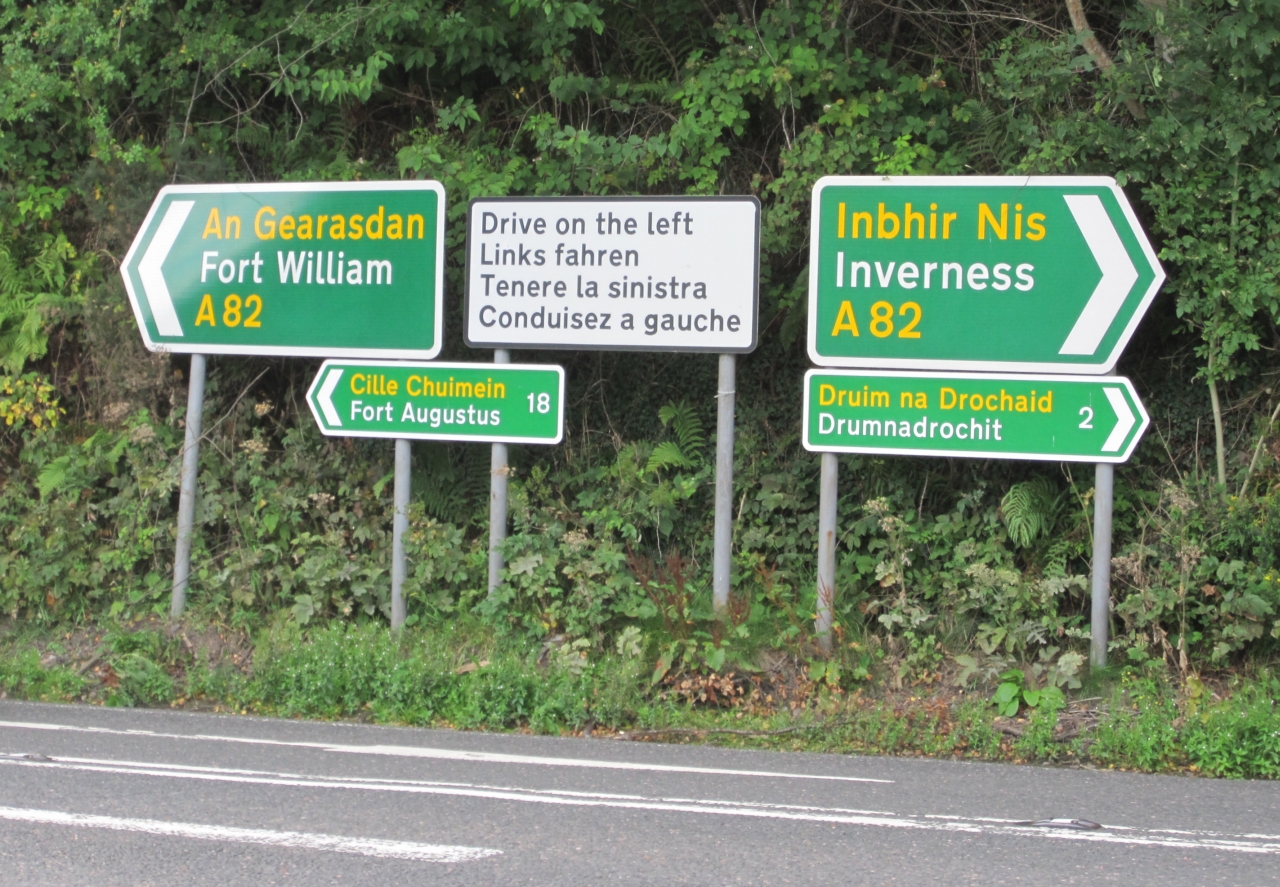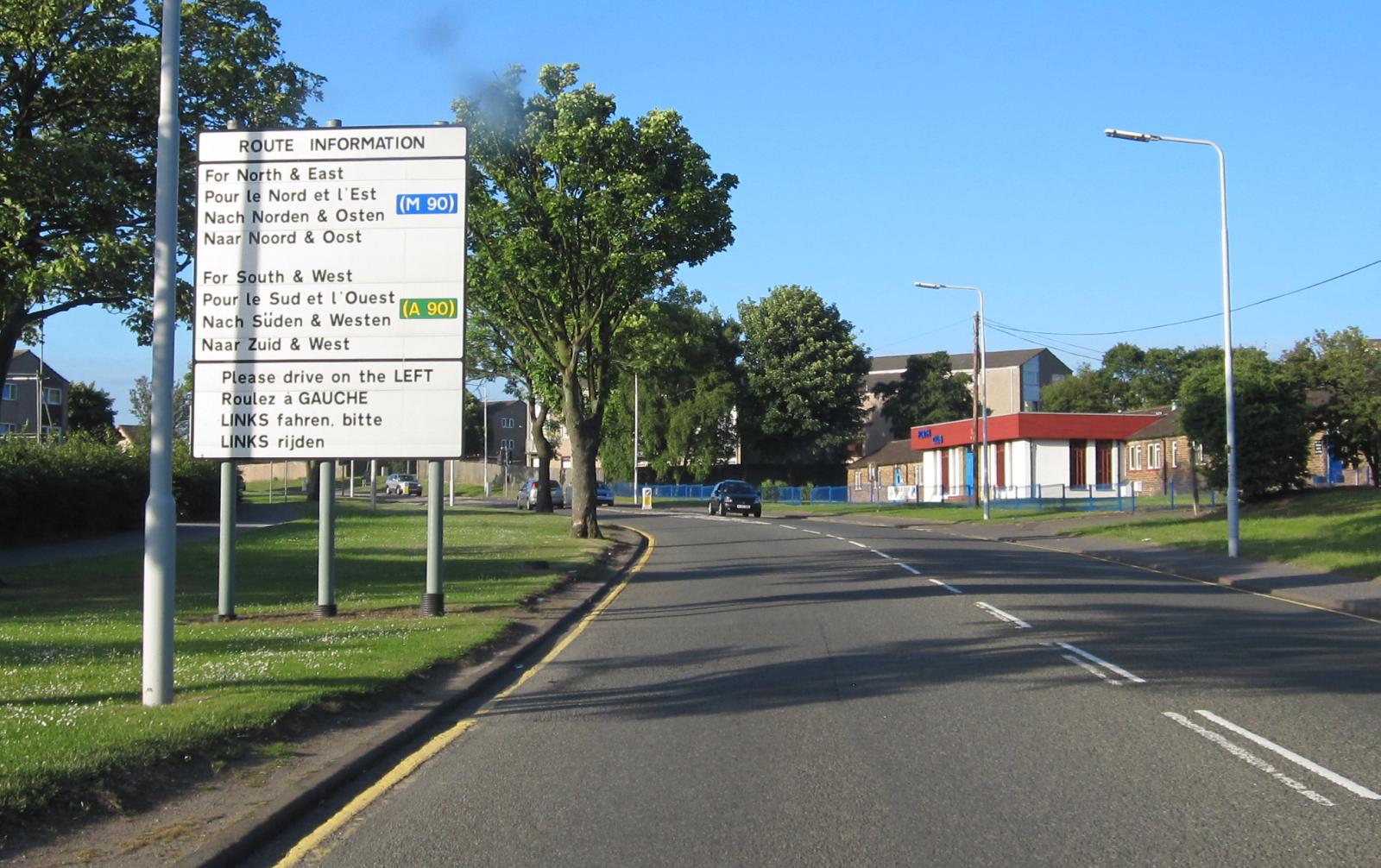
And also near ports.

Moderator: Site Management Team


I think I remember seeing them on the A9 heading North from Perth, presumably because that could be the first bit of S2 that a continental driver heading that way will encounter, and because the sparsity of traffic might enable the driver to forget in a way that you wouldn't if driving a traffic-clogged A40 or A15, for example.Glen wrote:"Drive on left" signs are common in the Highlands, especially at tourist attractions, in several languages.
Oh! Never seen the Gaelic name for Fort Augustus before; Cille Chulmein...
Nobody mentioned Ireland yet?!Comstock wrote:I notice someone has started a thread about bi lingual signs in Wales.
What other countries have bi-lingual signs? Do any have three or more languages on signs?
Surely that should be Gaelic, Scots, English and Norn and you are not implying that Scots is the game as English! Shock Horror.Nwallace wrote:I'm now wondering if there's any settlements in Scotland that's got different names in Gaelic, Scots/English and Norn
I may be suggesting that there are no English language place names in Scotland at allbothar wrote:Surely that should be Gaelic, Scots, English and Norn and you are not implying that Scots is the game as English! Shock Horror.Nwallace wrote:I'm now wondering if there's any settlements in Scotland that's got different names in Gaelic, Scots/English and Norn
Scots and English are mutually comprehensible being West Germanic off shoots of the same stem, West Germanic-Old English. Scots is closer to Old English than modern English is! So the pot gets stirred.Nwallace wrote:I may be suggesting that there are no English language place names in Scotland at allbothar wrote:Surely that should be Gaelic, Scots, English and Norn and you are not implying that Scots is the game as English! Shock Horror.Nwallace wrote:I'm now wondering if there's any settlements in Scotland that's got different names in Gaelic, Scots/English and Norn
I think most European countries contain areas of strong language minorities. The signs are often bilingual in those areas.Comstock wrote:I notice someone has started a thread about bi lingual signs in Wales.
What other countries have bi-lingual signs? Do any have three or more languages on signs?
You can't deny that in terms of linguistic history, but if you look at how many words they took from Dutch and North German (rather than their closere linguistic relatives), it's probably fair to say that English, Scots and Frisian are now miles away. Compare today's news in Frisian with the Scots language Wikipedia and you'll see a further form of evidence how pots do get stirred.exiled wrote:Scots and English are mutually comprehensible being West Germanic off shoots of the same stem, West Germanic-Old English. Scots is closer to Old English than modern English is! So the pot gets stirred. The third member of our linguistic family, ie our closest linguistic relative, is Frisian. It has helped Frisian confidence that its closest relation is not Dutch, but English.
I've always thought the Belgian signs in general look a bit shabby. They very often look like they've been knocked together by a local in his garden shed. (Please don't take this as a slight against the Belgian nation. I am very much a Belgophile, but they really could do with sorting their signs out.)brombeer wrote:Going slightly off-topic, Wallonia has been working on a new style of signage, but despite this new style having been around for ten years or so, you still do not see it an awful lot. That's what you get in an area where signs won't be replaced until they truly fall apart. You can see the new style on my website.
In the French far North, there are indeed bilingual references to many Flemish towns: Gent, Kortrijk, De Panne, Ieper. The French exonym always comes first and in a way you should be glad when there is also Dutch on the sign. This deviates from signs in the North-East of France and in fact Wallonia, where French exonyms for German towns (e.g. Sarrebruck for Saarbrücken, Trèves for Trier and Fribourg-en-Brisgau for Freiburg im Breisgau) have been gradually removed over time. Germany, The Netherlands and many other European countries have also adapted this as the new style of referring to places in different language areas: always the endonym and addition of an exonym only if space permits and motorists could get confused as a result of not knowing the actual name of the town.
It seems that the makers of these signs can't agree on the French term. The pictures show both "roulez à" and "conduisez à" gauche, and think the ones coming out of Dover use "tenez la gauche".Glen wrote:"Drive on left" signs are common in the Highlands, especially at tourist attractions, in several languages.
(picture snipped)
And also near ports.
(picture snipped again)